Introduction:
The logistics industry has been rapidly evolving, with technological advancements playing a vital role in this transformation. One of the most significant technological innovations that have changed the logistics industry is the introduction of 5G technology. With the introduction of 5G technology, logistics companies can now deliver faster, more efficient, and reliable services. This article explores the impact of 5G on the logistics industry.
What is 5G Technology?
5G is the latest wireless communication technology that delivers faster download and upload speeds, higher network capacity, and reduced latency. This technology is a significant improvement over 4G technology, which was the previous wireless communication standard. The implementation of 5G technology in the logistics industry has revolutionized the way businesses operate.

Improved Communication and Data Transfer
5G technology has enabled logistics companies to improve communication and data transfer. With 5G, logistics companies can share real-time data, such as shipment information, warehouse inventory, and delivery status, with their customers. This information can be shared instantly, leading to faster decision-making and improved customer service.
Increased Automation and Efficiency
The implementation of 5G technology has also increased automation and efficiency in the logistics industry. Logistics companies can now use 5G-enabled devices such as sensors and drones to automate various processes such as inventory management, order processing, and delivery. This automation leads to increased efficiency, reduced costs, and faster delivery times.

Faster and More Efficient Delivery
5G technology has also enabled logistics companies to deliver goods faster and more efficiently. With 5G, logistics companies can track their vehicles in real-time, leading to better route planning and reduced delivery times. Additionally, the use of 5G-enabled sensors and drones allows logistics companies to monitor and track goods throughout the delivery process, ensuring timely delivery and increased customer satisfaction.
Challenges and Concerns
The implementation of 5G technology in the logistics industry is not without its challenges and concerns. The most significant challenge is the cost of implementing 5G technology. The high cost of upgrading infrastructure to support 5G technology may be a barrier for smaller logistics companies. Additionally, concerns around data privacy and security remain a significant concern, with increased data sharing and storage.
The implementation of 5G technology in the logistics industry has revolutionized the way businesses operate. Logistics companies can now deliver faster, more efficient, and reliable services, leading to increased customer satisfaction and reduced costs. While there are challenges and concerns associated with the implementation of 5G technology, the benefits far outweigh the risks. As the logistics industry continues to evolve, 5G technology will undoubtedly play a vital role in shaping its future.
The Future of 5G in Logistics
The implementation of 5G technology has only scratched the surface of its potential in the logistics industry. As technology continues to evolve, logistics companies can expect even more benefits from 5G technology. For instance, the use of autonomous vehicles and drones in logistics is already being tested, and 5G technology will play a significant role in their implementation. Autonomous vehicles and drones can help reduce delivery times and increase efficiency, and with 5G technology, logistics companies can ensure they are tracked and monitored in real-time.
Additionally, the use of virtual and augmented reality in logistics operations is another area where 5G technology can make a significant impact. With the high speeds and low latency of 5G technology, logistics companies can provide customers with immersive virtual experiences that allow them to see and experience their products before purchasing.

The Role of Collaboration in 5G Implementation
The implementation of 5G technology in the logistics industry requires collaboration between logistics companies and telecommunication providers. Telecommunication providers need to upgrade their infrastructure to support 5G technology, while logistics companies need to invest in 5G-enabled devices and systems.
Furthermore, collaboration between logistics companies themselves is essential in the implementation of 5G technology. Logistics companies can share their expertise and resources to ensure the successful implementation of 5G technology in the logistics industry.
The Impact of 5G on Supply Chain Management
The introduction of 5G technology has revolutionized supply chain management by providing real-time visibility and data sharing. Logistics companies can now use 5G-enabled devices to track and monitor goods throughout the supply chain, from the point of origin to the final destination. This visibility enables logistics companies to identify potential issues and address them before they become significant problems, leading to increased efficiency and reduced costs.
Additionally, 5G technology enables logistics companies to implement predictive analytics, allowing them to predict demand and adjust their supply chain accordingly. Predictive analytics can help logistics companies optimize inventory levels, reduce waste, and improve the overall efficiency of their supply chain.
The Impact of 5G on Sustainability
Sustainability is a significant concern in the logistics industry, and the implementation of 5G technology can help logistics companies become more sustainable. With the use of 5G-enabled devices, logistics companies can optimize routes and reduce fuel consumption, leading to lower carbon emissions. Additionally, 5G technology enables logistics companies to track and monitor the environmental impact of their operations, allowing them to identify areas for improvement and implement sustainable practices.
The Challenges of Implementing 5G Technology in Logistics
While the benefits of 5G technology in the logistics industry are significant, the implementation of this technology is not without its challenges. One significant challenge is the high cost of upgrading infrastructure to support 5G technology. This cost may be a barrier for smaller logistics companies, and it may take time for the technology to become widely adopted.
Another challenge is the potential for cybersecurity threats. With increased data sharing and storage, logistics companies need to ensure that their systems are secure and protected from cyber-attacks. Furthermore, logistics companies need to ensure that they comply with data protection regulations, such as GDPR, to protect the privacy of their customers’ data.

Conclusion
The implementation of 5G technology in the logistics industry has significant benefits, such as increased efficiency, faster delivery times, improved customer satisfaction, and sustainability. While there are challenges and concerns associated with the implementation of 5G technology, collaboration between logistics companies and telecommunication providers can overcome them. The logistics industry needs to embrace 5G technology to remain competitive, provide excellent services to their customers, and ensure a sustainable future.



